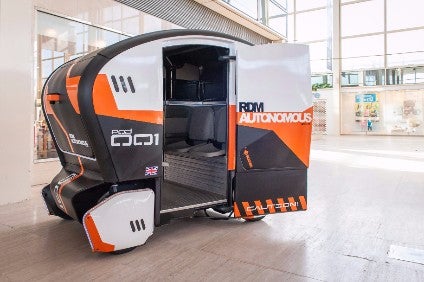
UK autonomous vehicle designer and manufacturer RDM Group said it would use an A$1m (GBP621,500; USD771,800) South Australian government grant for local trials of its mobility technology.
The company specialises in small self-driving and guided vehicles for factory and warehouse logistics and they are also used in airports and other similar locations.

Discover B2B Marketing That Performs
Combine business intelligence and editorial excellence to reach engaged professionals across 36 leading media platforms.
It employs 65 people at its headquarters in England's West Midlands and was awarded the grant through the Australian state government's A$10m Future Mobility Lab Fund.
Adelaide-based autonomous programme director, Roger van der Lee, said the funding would also be used to further establish the company's Asia-Pacific base at Adelaide's Tonsley innovation precinct.
Opened in 2015, the campus is the Adelaide branch of Melbourne-based Flinders University and is on the site of the former Mitsubishi Australia/Chrysler Australia car factory which operated there for about 40 years.
"Our base within the Flinders University campus at Tonsley is our first international facility and we're very keen to start building a supply chain for our technology throughout Australia and the Asia-Pacific region," van der Lee said.
"RDM Group is already exploring trial opportunities with Flinders University and a range of other organisations interested in 'first and last mile' transport and logistics solutions.
"With global interest in autonomous freight and passenger transport systems growing rapidly, we want to make sure we are at the forefront of this cutting-edge new industry."
RDM Group's move to Adelaide followed a successful showcase of the company's 'Pod Zero' at last year's 23rd World Congress on Intelligent Transport Systems in Melbourne.
As part of its local operations, the company will employ a Flinders University PhD student to boost the collaborative development of new technologies associated with the autonomous vehicles, such as efficient air conditioning and solar nanotechnology and integrations of the pods into the public transport network.
Van der Lee said interest in RDM Group's 'Pod Zero' was gaining international momentum after successful trials at Cenex in the UK.
"The Pod has two variants – four-seater and eight-seater – with an operating speed up to 24 km/h, multiple battery options up to eight hours or 80 km (50 miles), wheelchair accessibility, and air conditioning.
"Our pods operate autonomously through multiple sensor technologies, including stereo cameras, LiDARS (laser-based light detection and ranging sensors), odometry and ultrasonics.
"The operation of the pods can be supervised externally, and there is pod-to-pod communication to allow for multiple logistics solutions for warehouses, airports and other similar locations."
Group chairman Dave Keene said: "Establishing our base in Adelaide is hopefully a first step towards developing a bespoke assembly facility in South Australia that could potentially build hundreds of autonomous pods every year and create 10s of local jobs.
"This is a great example of innovation – developed in the UK – being exported all over the world and will hopefully put us on the international map for driverless vehicle technology."
RDM Group is a member of the Australian Driverless Vehicle Initiative (ADVI).






